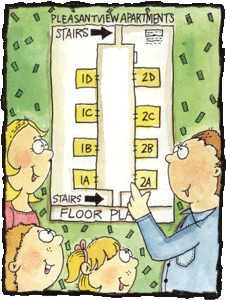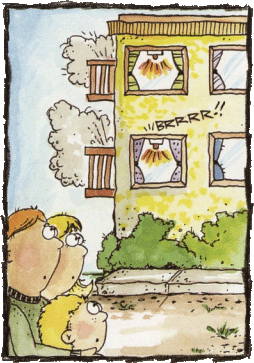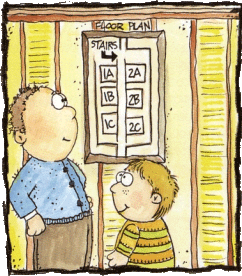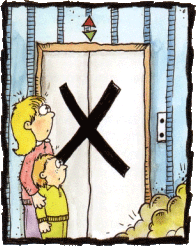Apartments & Highrise Buildings: Am I Fire Safe?
WHAT CAUSES MOST APARTMENT FIRES?
- Cooking/kitchen fires.
- Heating equipment such as stoves or space heaters.
- Smoking materials are a major cause of fatal apartment fires.
- Arson, including child fireplay.
HOW IS MY APARTMENT BUILDING DIFFERENT FROM OTHER HOMES?
 Fire safety is everyone's responsibility. Every resident should plan to be fire safe.
Fire safety is everyone's responsibility. Every resident should plan to be fire safe.- Since most high-rise buildings are constructed of fire resistant materials and contain enclosed stairwells, fires are generally confined to individual rooms or apartments, furnishings or possibly one floor.
- Wood frame buildings up to 4 stories in height have either enclosed stairwells, or older buildings may have external fire escapes.
- Stairwell doors are fire doors that must be closed at all times to prevent the spread of fire, smoke and poisonous gases.
- An apartment or high-rise fire is no cause for panic. If you plan ahead and practice fire drills, your chances of survival are greatly increased.
- Ensure your building has fire safety plans, including floor plans and evacuation procedures. Fire safety plans should be posted and visible. If they are not, contact the landlord or building manager. Take the time to review and learn your building's fire safety plan.
HOW WILL I KNOW IF THERE IS A FIRE?
- Your building should be equipped with smoke detectors and other fire alarm components.
- Learn to recognize the sound of the fire alarm, and leave the building immediately when you hear it. Never ignore the alarm, as fire may be present in any part of the building.
 |
| Always evacuate when the alarm sounds. |
 |
| Review evacuation procedures. |
- It is recommended that every dwelling have a smoke alarm outside each sleeping area and on every level of the home. For maximum protection install a smoke alarm in every bedroom.
- Test smoke alarms monthly and for battery operated smoke alarms change the batteries at least once a year. Clean smoke alarms at least once every six months by gently vacuuming the exterior. Smoke alarms should be replaced at least every ten years.
WHAT'S THE PLAN FOR MY BUILDING?
- Floor plans and evacuation procedures must be posted on every floor. Take time to learn them.
- Develop and practice your fire safety plan. Know the two quickest and safest ways out of your building.
- Designating and training a fire warden on each floor of the building is recommended to ensure safe evacuation and ongoing safety programs.
- Have a fire drill at least once a year, but practice your escape plans regularly. Coordinate practice drills with neighbours, fellow workers, the floor warden, and the building manager.
- Someone should be assigned to help people with disabilities who may need assistance to evacuate safely.
HOW DO I ESCAPE FROM THE FIRE?
- Get out quickly and safely.
- If an announcement can be heard over your building's public address system, listen carefully and follow directions.
- Check doors before opening them. Stay low behind the door, reach up and feel the door and the door handle for heat. If the door feels cool, brace yourself against it and open it slowly. If safe, leave the building and go directly to your meeting place. If you encounter smoke, crawl low under the smoke. Cleaner air is down low near the floor.
- If the door feels warm, or if you see smoke or flames on the other side of the door, shut the door and stay in your apartment. Protect yourself by sealing the openings around the door and vents with bedding or towels. Call the fire department using your local emergency number to notify them of your location. If there is no smoke outside a window, open it and signal for help. Never go to the roof as you may become trapped with no means of escape or protection.
 |
| Never use elevators in a fire. |
- Never use elevators in a fire! Use the stairways and close all doors behind you to slow the spread of fire and smoke.
- Once you are out of the building go directly to your planned meeting place. Do not re-enter the building. Ensure 9-1-1 or your local emergency number has been called.
- In a hotel fire, be sure to take your room key with you. You may encounter smoke and need to re-enter your room for safety.
IS THERE ANYTHING ELSE I NEED TO KNOW?
- Be careful with smoking materials. Large, deep, sturdy ashtrays are best. Soak smoking materials with water before discarding. Check furniture and cushions for dropped matches and cigarettes. Never smoke in bed. Smokers must remember that alcohol and medications can make you less alert.
- Keep matches and lighters high on a shelf or in a cupboard where children can't get them.
- Never leave cooking food unattended. If a pan catches on fire, use a pot holder or oven mitt and slide a lid or cookie sheet over the flames and turn off the burner.
- Keep space heaters at least 1 metre (3 feet) from combustibles.
- Replace worn or damaged electrical cords. Do not overload electrical outlets. Use an approved power bar/electrical receptacle for additional electrical cords.
- Do not store flammable liquids (gasoline) or compressed gases (propane) in your building, car or storage locker.
- Do not use balconies for storage. This can block a means of escape, as well as become a target for arsonists.
| Sponsored By: | ||||
 |
 |
 |
 Insurance InsuranceBrokers Association |
 |
| Greater Vancouver Fire Chiefs Association Public Education Committee | ||||
